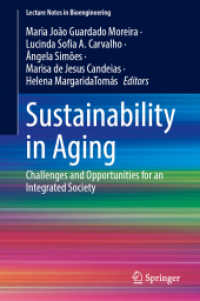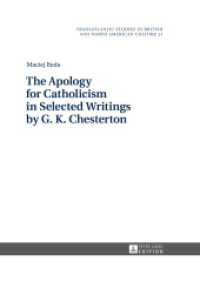Full Description
This volume continues the series' engagement with intellectual and cultural pluralism in the Middle Ages, showcasing the best new work in this field.
New Medieval Literatures is an annual of work on medieval textual cultures Its scope is inclusive of work across the theoretical, archival, philological, and historicist methodologies associated with medieval literary studies, and embraces the range of European cultures, capaciously defined.
Texts analysed here range in date from the late ninth or early tenth centuries to the fifteenth century, and in provenance from the eastern part of the Hungarian kingdom to the British Isles. European understandings of the world are explored in several essays, including historiographical perspectives on the Mongol Empire and "world-building" in the romances of the Round Table. In their consideration of translation - of English diplomatic texts into French, of the Latin Boethius into Old English, of Old Turkic and Mongolian into Latin - several contributors reveal complex medieval multilingual societies, while translatio is shown to be weaponised in international scholarly rivalries. Bibliophilia, book collection, and book production inform identity-formation, shaping both nationalisms and the many-layered identities of fifteenth-century merchants. Several essays engage revealingly with economic humanities. Account books provide traces of book production capacity in the unlikely location of Calais; credit finance provides metaphors for human relations with the divine in the Book of mystic Margery Kempe; and women broker credit in real-world scenarios too. Other essays engage with sensory studies: sight and optics are shown to inform ethnography, while smell and taste - often considered beyond the reach of language - emerge as surprisingly central in some religious and philosophical writings.
Contents
List of Illustrations
Editors' Note
List of Abbreviations
1. Feeling Thinking in the Old English Boethius - Jennifer A. Lorden
2. Arthurian Worldbuilding Around the Round Table: Wace's History, Chrétien's Fictions, and Continental Romance - Michael Lysander Angerer
3. Gautier de Coinci's Miracles de Nostre Dame and the Powers of Olfaction - Henry Ravenhall
4. Obscured by Smoke: Occluded Sight as Epistemological Crisis in Eyewitness Narratives of the 1241-2 Mongol Invasions - Misho Sarah Ishikawa
5. Richard de Bury's Philobiblon, Translatio Studii et Imperii, and the Anglo-French Cultural Politics of the Fourteenth Century - Emma-Catherine Wilson
6. Margery Kempe's Penitential Credit - Nancy Haijing Jiang
7. Books, Translation, and Multilingualism in Late Medieval Calais - J. R. Mattison







